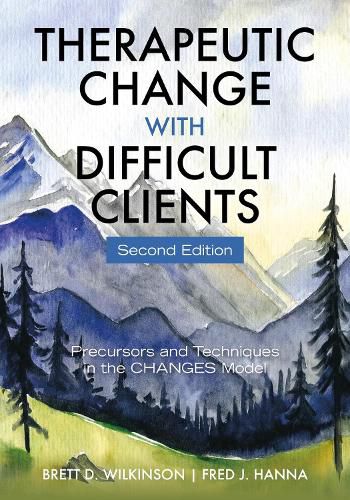Readings Newsletter
Become a Readings Member to make your shopping experience even easier.
Sign in or sign up for free!
You’re not far away from qualifying for FREE standard shipping within Australia
You’ve qualified for FREE standard shipping within Australia
The cart is loading…






Now in its second edition, Therapeutic Change with Difficult Clients describes a common factors model for understanding and activating the process of change with challenging clients.
For therapists, the most difficult clients to treat are often those who have little interest in change. Whether they believe that change is a waste of time, or a threat to their personal freedom or sense of being, the difficulty of treating such clients reveals the limits of typical approaches to psychotherapy. A thorough understanding of the true nature therapeutic change is often the most important step toward improving psychotherapy effectiveness.
The CHANGES model, which has been significantly expanded and updated since the first edition of this book, is founded on the seven precursors of change, which are identified, assessed, and activated in the context of therapeutic encounters. The authors examine the capacities of individuals to generate therapeutic change, identify the barriers to change, and discuss the power of therapists to catalyze the change process using a variety of well established techniques. In addition to updated supporting literature, the authors discuss recent advances in neuroscience and the cognitive sciences, as well as new developments in the interpersonal aspects of therapeutic engagement.
$9.00 standard shipping within Australia
FREE standard shipping within Australia for orders over $100.00
Express & International shipping calculated at checkout
Stock availability can be subject to change without notice. We recommend calling the shop or contacting our online team to check availability of low stock items. Please see our Shopping Online page for more details.
Now in its second edition, Therapeutic Change with Difficult Clients describes a common factors model for understanding and activating the process of change with challenging clients.
For therapists, the most difficult clients to treat are often those who have little interest in change. Whether they believe that change is a waste of time, or a threat to their personal freedom or sense of being, the difficulty of treating such clients reveals the limits of typical approaches to psychotherapy. A thorough understanding of the true nature therapeutic change is often the most important step toward improving psychotherapy effectiveness.
The CHANGES model, which has been significantly expanded and updated since the first edition of this book, is founded on the seven precursors of change, which are identified, assessed, and activated in the context of therapeutic encounters. The authors examine the capacities of individuals to generate therapeutic change, identify the barriers to change, and discuss the power of therapists to catalyze the change process using a variety of well established techniques. In addition to updated supporting literature, the authors discuss recent advances in neuroscience and the cognitive sciences, as well as new developments in the interpersonal aspects of therapeutic engagement.